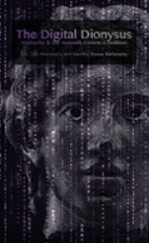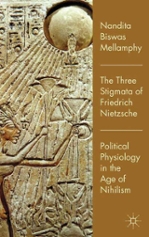 Nandita Biswas Mellamphy
Nandita Biswas Mellamphy
The Digital Dionysus: Nietzsche and the Network-Centric Condition (editor)
Can Nietzsche be considered a thinker of media and mediation, as the German media theorist Friedrich Kittler declared in his influential book Gramophone, Film, Typewriter?
Nietzsche was a truly transdisciplinary thinker, one who never fit into his own 19th-century surroundings and who recognized himself as a ‘herald and precursor’ of the future, of our globally-reticulated digital present. Perhaps not since Kittler has there been a study — let alone an anthology — that re-assesses and re-evaluates Nietzsche’s thought in light of the technically mediated and machinic conditions of the human in the age of digital networks.
Drawing on the first four years of conference-proceedings from the annual Nietzsche Workshop @ Western (NWW, Western University, Ontario), which culminated in the “New York NWW.IV”: Cyber-Nietzsche: Tunnels, Tightropes, Net-&-Meshworks (held at the Center for Transformative Media, Parsons The New School for Design), The Digital Dionysus explores Nietzschean themes in light of the problems and questions of digitization, information and technical mediation, offering its readers the opportunity to consider Nietzsche’s contemporary relevance in light of emerging theories in new media studies, political studies, critical aesthetics, the digital humanities and contemporary post-continental philosophy. 2015, Punctum Books.
 The Three Stigmata of Friedrich Nietzsche: Political Physiology in the Age of Nihilism
The Three Stigmata of Friedrich Nietzsche: Political Physiology in the Age of Nihilism
Since the early twentieth century, scholarly debate has revolved around the status of the 'political' in the thought of Friedrich Nietzsche. Following Nietzsche's call for a 'philosopher-physician' and his own use of the bodily language of 'health' and 'illness' as tools to diagnose the ailments of the body politic, this book is the first to offer a reconstruction of the concept of 'political physiology' in Nietzsche's thought. Biswas Mellamphy presents Nietzsche's political physiology by inter-relating three concepts not usually treated together: great politics, eternal recurrence, and the philosopher of the future. By bridging some of the interpretive gaps between the Anglo-American, German and French schools of interpretation, Nietzsche's political physiology is presented as a politics of subjective transmutation within the context of that pervasive pathological condition of modernity called 'nihilism'. This book charts the pathology of nihilism in Nietzsche's thought and argues that Nietzsche's political physiology is, first and foremost, a politics of emergent ontology. 2011, Palgrave Macmillan.



